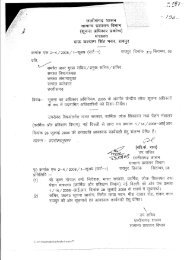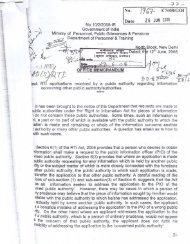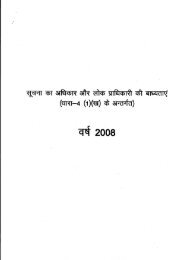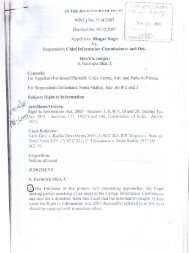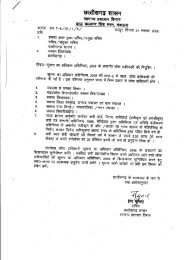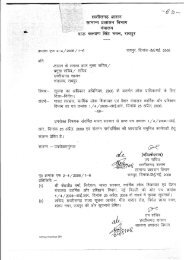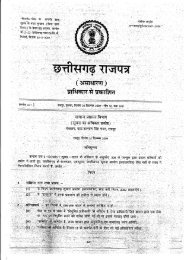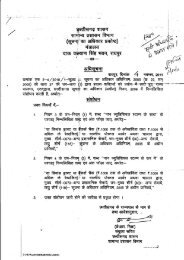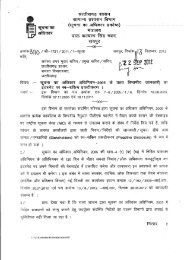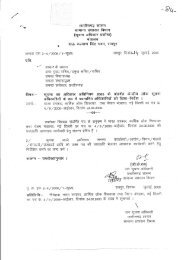sn" - CG State Information Commission
sn" - CG State Information Commission
sn" - CG State Information Commission
Create successful ePaper yourself
Turn your PDF publications into a flip-book with our unique Google optimized e-Paper software.
- -?+:::1 .,.t;:.:L.::ir::!tji:i.114, r..::f:;-::+.n.r ::r:,j tr-r:l;.right to appeal. But in absence of the particulars of the appellate authority, theapplicant may facedifficulty in making an appeal. All the.public authorities should, therefore,designale the First Appellate Authorities and publish their particulars alongt^iith the particulars ofthe Public lnformation Officers.Acceptance of.Fee12. According to the Right to lnformation (Regulation of Fee and Cost) Rules, 2005 asamended by the Right to lnformation (Regulalion of Fee and Cost) Rules, 2006, an applicantcan make payment of fee in cash or by demand draft or banker's cheque or lndian Postal Orderpayable to the Accounls Officer of the public authority. The public authority should ensure thatpayment by any of the above modes is not denied or the applicant is not compelled to draw IPOetc. in the hame of any officer other than the Accounts Officer. .lf any public authority does nothave any Accounts Officer, it should designate an officer as such for the purpose'of receivingfee under the RTI Act or rulds made thereunderCompliance of the Orders of the lnformation <strong>Commission</strong>13. While deciding an appeal, the lnformation Comrnission, may require the concernedpublic authority to take such sleps as may be necessary to secure compliance with theprovisions of the Act. ln this regard the <strong>Commission</strong> may pass an order to provide information toan applicant in a particular form; appoint a Public lnformation Officer; publish certain inforrirationor categories of infonnation; make necessary changes to its practices in relation to themaintenance, management and destruction of records; enhance the provision of trainingj for itsofficials; provide an annual report as prepared in'compliance with clause (b) of subsection (1) ofsection 4 of the Act.14. The <strong>Commission</strong> has power to pass orders requiring a public authority to compensaGthe complainant for any-loss or other detriment suffered by him. ll also has power to impbsepenalty on the Public lnformation Officer as provided in the Act. lt rnay be noted that penalty isimposed on the Public lnformation-Officer which is to be paid by him. However,..thecompensation, ordered by the <strong>Commission</strong> to be paid to an applicant would have to be paid bythe public authority,15. ,- The decisions of lhe <strong>Commission</strong> are binding. The public authority should ensure that,-,:t,',thg,gdeiSrpessedlby,the <strong>Commission</strong> are implemented- lf any:public aqthority or a PlO.is of:.i,.,,::':;t'he fidini'lhiit an oider of the Gommission is not in consonance'with the pr:ovisions of the Act, it''t"y,"pproach the High Court by way of a Writ Petition.Greation of Gentral Point17. Sub-section (1) of Section 5 of the Right to lnformation Act, 2005 mandates all publicauthoritieS to desighate as many Fublic lnformation Officers as necessary to provide informationunder the Act. Where a public authority designates more than one Public lnformation Officerl0



